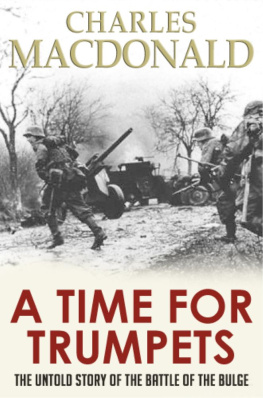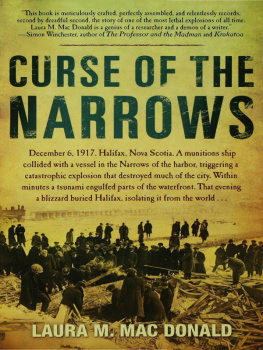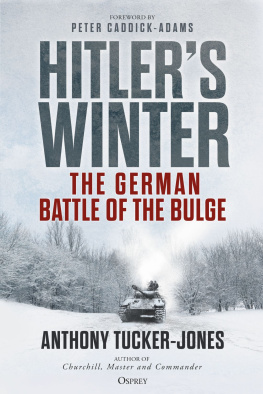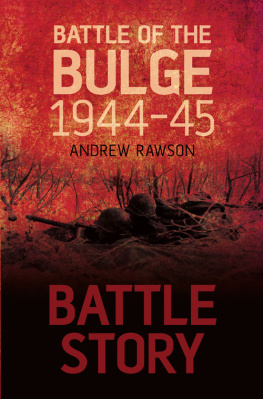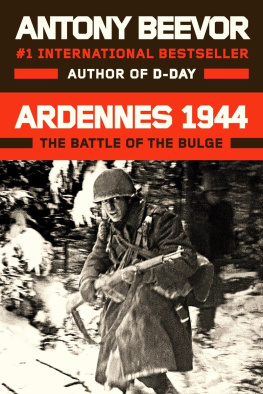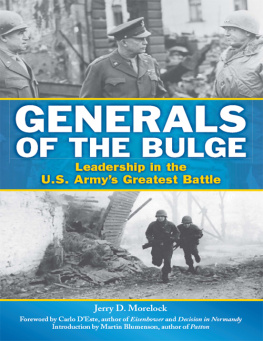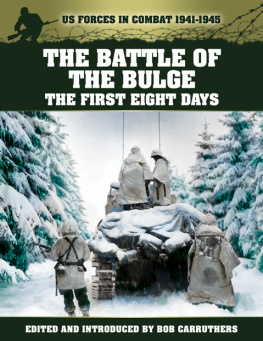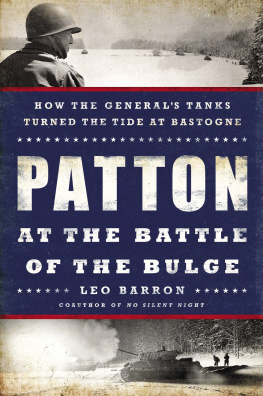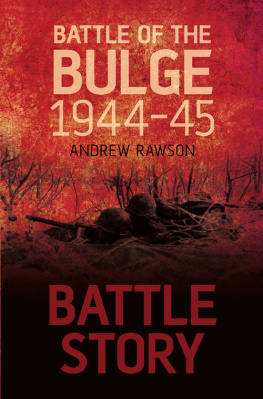A Time for Trumpets: The Untold Story of the Battle of the Bulge
Charles B. MacDonald
Copyright Charles B. MacDonald 1985
The right of Charles B. MacDonald to be identified as the author of this work has been asserted by him in accordance with the Copyright, Designs and Patents Act, 1988.
First published in the United Kingdom in 1985 by Perennial.
This edition published in 2015 by Endeavour Press Ltd.
For my brother , Rae , his wife , Nannie , and theirs , and for the American soldiers and airmen who fought in the Ardennes .
Table of Contents
Prologue
Located in western reaches of the Ardennes region of Belgium, the village of Bande had little distinction. It was just another farming village, lacking the narrow, winding, cobblestoned streets and mountain-like setting of so many villages and towns that help make the Ardennes a picture postcard region.
In early September, 1944, on either side of the main highway through the village the Grand Rue stood a cluster of ten to twelve red brick buildings, mostly dwellings but some with small shops on the ground floor. One was the Caf de la Poste. Along a winding side road up a gently sloping hill were other houses belonging mostly to farmers, as might be discerned from their attached barns and from compost heaps almost always located near the front door. At the top of the hill was a small church of drab gray native stone. Much of the nearby land was cultivated, but two or three miles away on every side were forests.
Since less than a thousand people lived in Bande, it was of insufficient importance for the German Army to station occupation troops in the village. The entire region fell under the jurisdiction of the Kreiskommandant in Bastogne, twenty-four miles to the southeast, and there was a detachment of Feldgendarmerie eight miles to the northwest in Marche. In a nearby forest, close to a hundred German soldiers lived in wooden barracks, their duty to guard Russian prisoners of war who worked in an ammunition depot.
During the first days of September, 1944, the exhilaration of impending liberation was in the air in Bande. Adding to the excitement, word spread among the villagers that a group of Belgian resistance fighters of the Arme Secrte had moved into a nearby wood. Such was the elation of approaching freedom after four long years of omnipresent German soldiers their hobnailed boots, their imperious commands, their edicts, their requisitions, their unannounced knocks in the night that might mean a loved one seized for deportation that some of the villagers defiantly displayed the black, red, and yellow Belgian flag. A bas les Boches !
Before daylight on September 5, men of the Arme Secrte attacked the German barracks at the ammunition depot. Three German soldiers died in the attack. The next day, the Germans surrounded the center of Bande along the Grand Rue, ordered the inhabitants from their homes, and systematically put the torch to every building.
Two days later, on September 8, as troops of the American 9th Infantry Division approached, the last of the German soldiers hurriedly departed. As they left, some of them shook their fists at the obviously exultant inhabitants. Well be back! they shouted.
*
On September 16, 1944, the man who had plunged the world into the most devastating war in the history of mankind, Adolf Hitler, Chancellor of Germany and self-styled Fhrer, summoned a number of senior officers to his study. It was in a huge, underground steel-reinforced concrete bunker within the Wolfschanze (Wolfs Lair), Hitlers field headquarters in the swampy pine forest of Gorlitz in East Prussia. Those summoned had come to constitute a kind of household military staff. Among them was one of the few wearing the red stripes of the General Staff on their trews whose advice Hitler still sought and sometimes heeded, the head of the operations staff of the Oberkommando der Wehrmacht , or OKW (Armed Forces High Command), General Alfred Jodl.
The officers were waiting when Hitler entered the study, his shoulders sagging, his face drained of color, looking considerably older than his fifty-four years. Although he had recovered from most of the injuries incurred not quite two months before when conspirators within the army had tried to assassinate him by setting off a bomb, smuggled into a conference in a briefcase, he still had a ruptured right eardrum and a sometimes uncontrollable twitching of his right arm. He also had spells of dizziness and a persistent sinus headache. The Fhrers voice had become hoarse (it would later be determined because of a benign growth on his vocal chords), and he sometimes had such severe stomach spasms that it was almost impossible for him to keep from crying out, an affliction (it would also be determined later) attributable to pills prescribed for flatulence by his personal physician, who was unaware that they contained strychnine and atropine. A steady diet of those pills had turned his skin yellow, as if he had jaundice, and that very morning, before calling the officers to his study, Hitler had had what was probably a mild coronary, the third in less than a week.
Taking a seat at his desk, Hitler asked Jodl to sum up the situation on the Western Front. Jodl first noted the strength of the opposing forces, which was heavily in favor of the Western Allies Great Britain, France, and the United States. Of more than a million German casualties incurred over the last three months, said Jodl, almost half had been in the West.
The German troops, he went on, were continuing their withdrawal from southern France, and in northeastern France they were trying to form a new line based upon sturdy old forts dating from the Franco-Prussian War. In the north they were forming new lines along canals and rivers in the Netherlands or falling back from Belgium into the border fortifications, the West Wall. There was one spot of particular concern, added Jodl, referring to a convoluted, heavily forested region encompassing eastern Belgium and much of the Grand Duchy of Luxembourg, where the Americans were attacking and the Germans had almost nothing: the Ardennes.
At the word Ardennes, Hitler sat erect and ordered Jodl to stop. A long pause followed.
I have made a momentous decision, the Fhrer said at last, the firmness of his voice belying his weakened condition, his blue eyes alight with a fervor that nobody had seen since the attempt on his life. I shall go over to the offensive, that is to say he slapped one hand down on a map that lay across his desk here, out of the Ardennes, with the objective, Antwerp!
*
With those words, Adolf Hitler set in motion preparations for a battle that was to assume epic proportions, the greatest German attack in the West since the campaign of 1940 had brought down the Netherlands, Belgium, Luxembourg, and France in swift and ignominious defeat. It was destined to involve more than a million men and to precipitate an unparalleled crisis for the Allied armies. It was also to involve one of the most egregious failures in the history of American battlefield intelligence. Yet it was also to become the greatest battle ever fought by the United States Army.
*
It was cold. A damp, penetrating cold, typical for the Grand Duchy of Luxembourg in the second week of December.
Elise Del and her son Jean plodded through heavy mist along a deserted highway that followed the west bank of the little Our River. To Elise, there was something almost eerie about returning to her village, Bivels, from which every living soul and even the pigs and cows had been evacuated. Yet she badly needed to get to her farmhouse on the steep slope overlooking the village, the house she had long shared with her husband, Mathias, until the Germans in October had taken him away. She had to get warmer clothes for herself and for Jean. Early that morning, December 10, with the approval of the civil authorities in Vianden (not quite two miles from Bivels), she and Jean had set out, Jean pulling a small cart in which to carry back their belongings.
Next page
